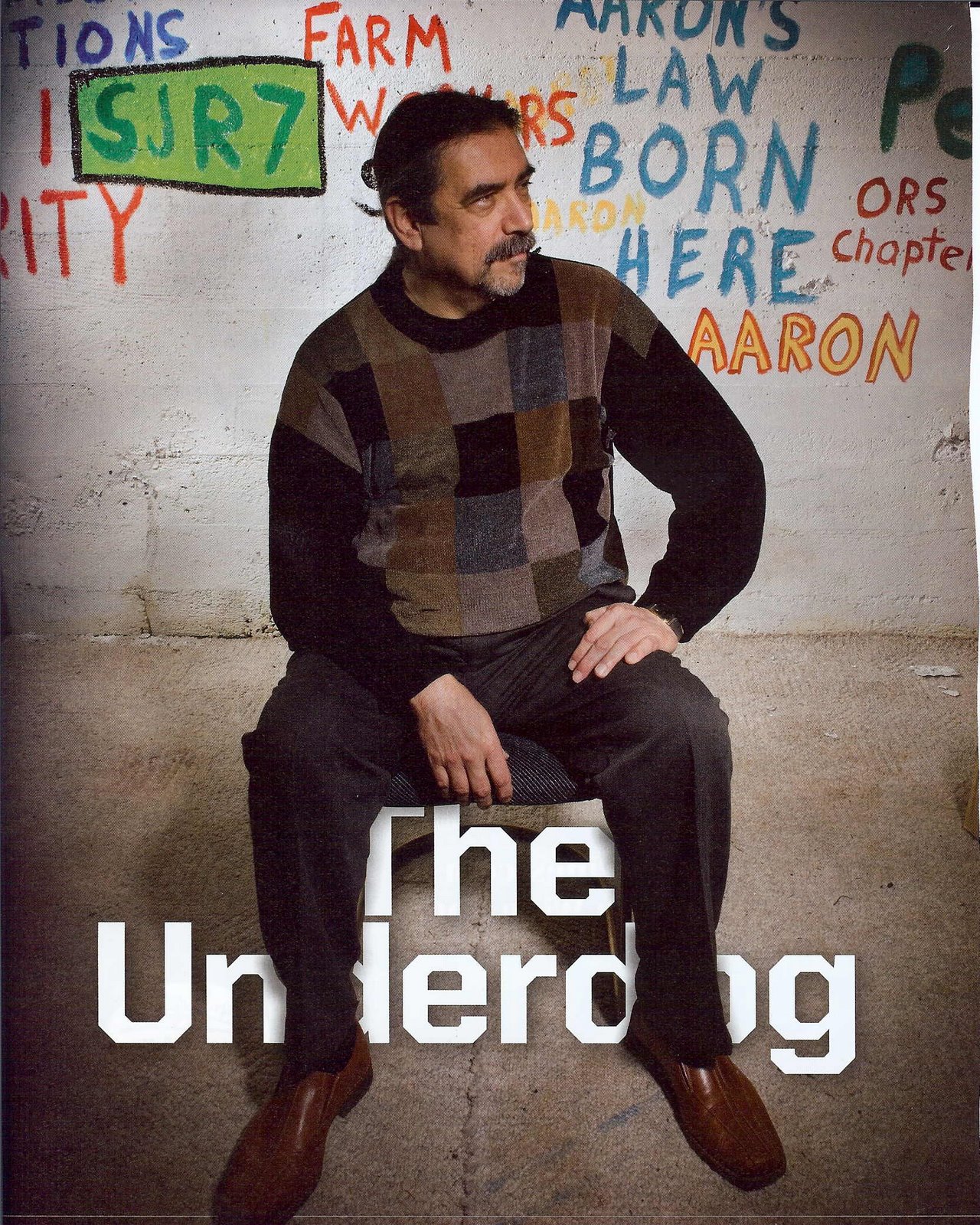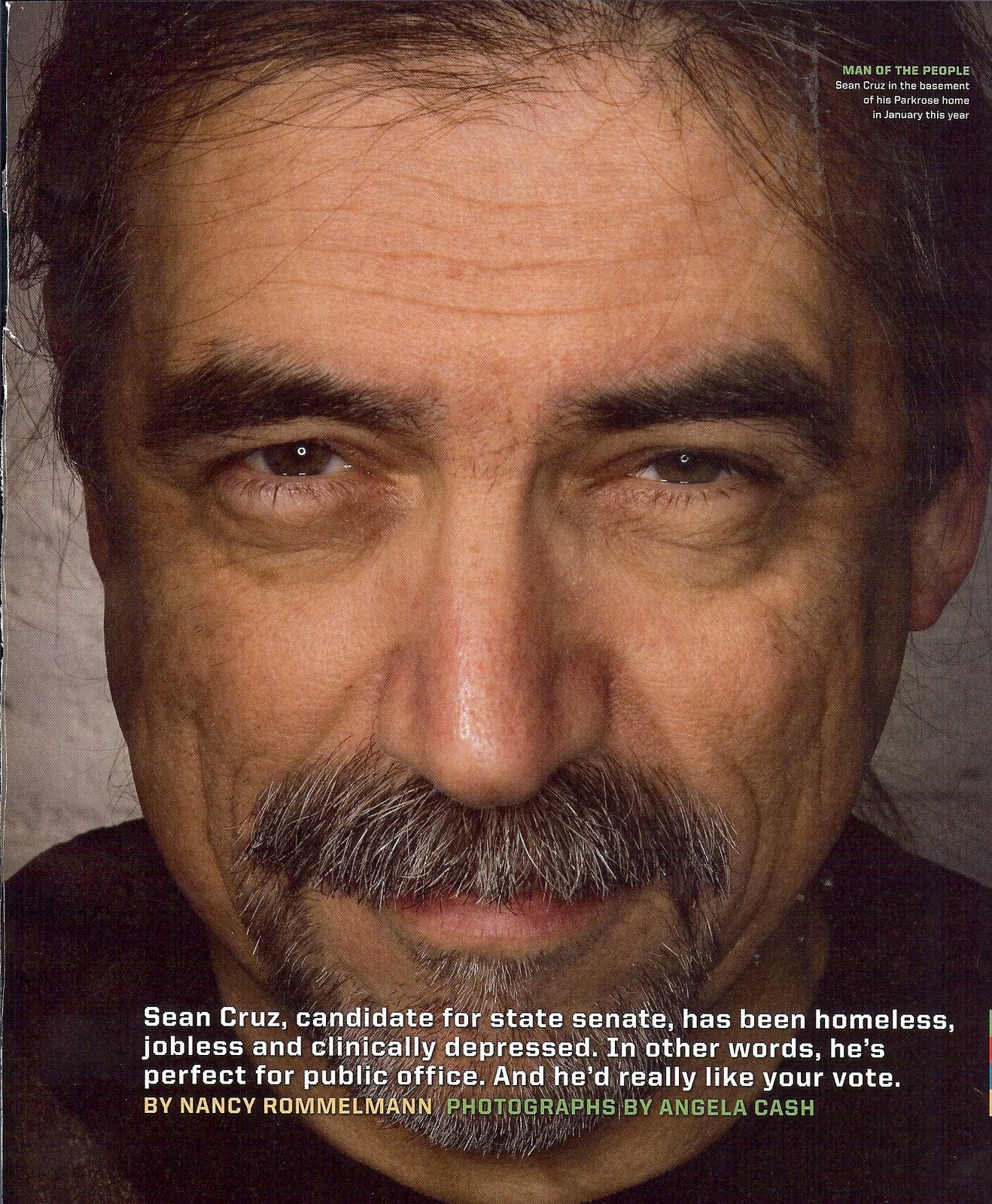Portland, Oregon--
I do not support the re-election of Gordon Smith. More on this later.
In this post, I want to address the issue of polygamy and Mormonism (they are the same issue) that has risen recently into the political discussion, first when Mitt Romney was competing for the Republican nomination, and now, with more local focus, since Mr. Smith raised the issue himself.
Some suggest that Mormon plural marriages are essentially about agreements between consenting adults, and others have said that the mainstream Mormon church’s official break from polygamous lifestyles renders the case (mostly) moot.
Both lines of thought view the issue too narrowly.
My comments in this series are informed by my experience of having spent ten years in the belly of the beast after my then-wife woke up one morning and discovered that she was a fervent True Believer, and after having experienced the disappearance of my four children into the Mormon parallel universe on February 12, 1996, more than twelve years ago.
The kidnapping was organized by a group of Mormon church leaders in Oregon, Washington and Utah, all of whom I have named in previous posts here: www.BlogoliticalSean.blogspot.com
None of these individuals are or were related to me or to my former wife. Their motivation was to carry out a Mormon shunning, and to bury my children as deep as they could in their doctrine.
This is how they keep the troops in line.
The experience led to the passage of Senate Bill 1041 (Aaron’s Law, named after my late son) in the 2005 legislative session, addressing the kidnapping of children by persons known to the children or to other family members.
Aaron’s Law and related posts are here: http://aaronslaw.blogspot.com/
The U. S. Department of Justice calculates the number of parental and family abductions in the United States as more than 200,000 cases annually.
Many of those children are taken out of the country, never to be seen again.
Children can vanish forever without leaving the U.S. also, and entering the Mormon Empire is one of those ways.
They moved my children from one secret location to another in small Utah towns, eventually ending up in Payson, not far from where the FLDS and other polygamous communities openly exist.
Consider the concepts that polygamous marriages are “consensual,” and that the break between mainstream and fundamentalist Mormon believers is complete or even actual, given the following facts and circumstances, all applicable to both LDS and FLDS splinter groups:
Both LDS and FLDS celebrate one of the most prolific polygamists in Mormon (and U.S.) history with a university system and a wide variety of towns and other political subdivisions named after Brigham Young.
Mormon doctrine, fundamental or otherwise, teaches that women and girls should be “meek and mild” and subservient to men.
Utah leads the nation in the percentage of children suffering abuse.
It is embedded in the culture.
The Mormon world is among the most paternalistic of societies, its leadership at all levels made up mostly of a privileged class of white men.
Under Utah law, a child of 13 can legally marry with the consent of only one parent.
In the FLDS/LDS world, it is young girls marrying older men, not boys marrying girls their own age or older, that describes the actual use of the law.
The law provides cover for the pedophiles in Mormon communities who are wealthy enough or have other power levers sufficient to support a lifestyle that commingles institutional womanizing and raising your own wives.
Put yourself in the shoes of an eight or nine-year-old girl, too young to understand exactly what “marriage” is, but beginning to understand that it is in her near future and that it will involve an older man and babies.
There is nothing consensual about this practice, occurring in the long shadow of Mormonism far more widely than is reported in the media or understood by the public.
The problem and dilemma facing mainstream Mormons and their polygamist heritage lies in the word that FLDS members and others use to describe themselves and their religious beliefs: “fundamental.”
The Salt Lake City Tribune reported on Gordon Smith’s apology for referencing Mormon polygamy in his comments on same-sex marriage. Here’s an excerpt and link:
Smith sought to do just that. Asked why he brought up his religious past, he offered this explanation:
''If you'd grown up a Mormon, and spent your life trying to get out from the shadow of that legacy, it's an emotional scar that you carry. I meant no offense by sharing that part of my history.''
He said he never meant to relate polygamy, which was practiced by early Mormons but is now rejected by the church, to same-sex marriage.
- Religion News Service
http://www.sltrib.com/faith/ci_9651973
To use words like “legacy” and “history” in a discussion of Mormonism and polygamy is highly disingenuous.
There are Mormon children eight and nine years old who are just learning their future does not involve chemistry or computer science or any form of higher education, for that matter.
Their destiny is to specialize in multiplication.
Some of their older sisters have already earned advanced degrees.
End part 1.
=============================
The Oregonian Editorial Board on Senate District 23:
“(Sean) Cruz…knows the issues well…”
“Sean Cruz, who has served as (Senator) Gordly's legislative aide and chief of staff for the past five years…is qualified for the job. He knows the issues that are important in the district, and he certainly knows how things get done in the Legislature. Most notably, he persuaded Gordly to push legislation, called ‘Aaron's Law,’ that gives families tools to punish parents for the crime of child abduction. “
===========================
Sunday, June 22, 2008
Sunday, June 15, 2008
Sean Cruz in transition
Portland, Oregon--
When Oregon State Senator Avel Gordly offered me the opportunity to serve on her staff prior to the 2003 legislative session, I only had one concern at the time: would we be working to improve the living and working conditions of Oregon’s farm workers?
Note that this conversation took place before the invasion of Iraq, before the Bush/Cheney administration’s gross misuse of the National Guard, before stop-loss and the many other breaches of faith with the nation’s military personnel and with our veterans and their families.
Back in 2002, I wanted to know whether we would serve as the voice for the voiceless.
Her affirmative response brought me on board, and one of the first bills she sponsored in the 2003 session addressed the discriminatory language in ORS statutes that specifically denied farm workers—and farm workers alone—the right to meal and restroom breaks during the workday.
That bill did not get a hearing, underscoring the fact that Oregon’s farmworkers (and Oregon’s Hispanic and Latino communities) have no real voice in the legislature and—with Senator Gordly’s retirement—no reliable friends there either.
Working with Bureau of Labor and Industries Commissioner Dan Gardner, we worked around the legislature to extend these basic rights to agricultural workers by administrative action, which became effective February 1, 2004.
Now I’ve been offered an opportunity to work with the Oregon Human Development Corporation (OHDC) out of the Gresham office, located in the Rockwood neighborhood, and I am transitioning to this next stage in my career.
My job will be to help our mostly Spanish-speaking clients transition successfully to new jobs that offer more stability and opportunity than farm work.
Here’s the link to OHDC: http://www.ohdc.org/
Our mission statement is “To promote economic and social advancement of farm workers, Hispanics and disadvantaged individuals through the provision of education, training, advocacy and services that enhance self-sufficiency.”
The most significant new challenge for me in this opportunity is to gain fluency in Spanish, and now I have the opportunity to speak, read and write every day.
I have been meeting with many of the array of partners that OHDC works with, mostly in East Multnomah County, and I look forward to contributing to the community in this new capacity.
Veterans and military family issues remain at the center of my agenda should the voters decide to send me to represent Senate District 23 in the November general election.
There is no need to look further than the record itself to see that veterans and military families have no champion in the Oregon Senate.
Sending my opponent to the Senate will not change that fact at all. Jackie
Dingfelder is only dimly aware that the nation is at war, and she believes that it is someone else’s responsibility in Washington D.C. to deal with it.
For me, veterans and military families have top priority.
I look forward to the coming fall campaign; meanwhile, andale!
=================================
The Oregonian Editorial Board on Senate District 23:
“(Sean) Cruz…knows the issues well…”
“Sean Cruz, who has served as (Senator) Gordly's legislative aide and chief of staff for the past five years…is qualified for the job. He knows the issues that are important in the district, and he certainly knows how things get done in the Legislature. Most notably, he persuaded Gordly to push legislation, called ‘Aaron's Law,’ that gives families tools to punish parents for the crime of child abduction. “
When Oregon State Senator Avel Gordly offered me the opportunity to serve on her staff prior to the 2003 legislative session, I only had one concern at the time: would we be working to improve the living and working conditions of Oregon’s farm workers?
Note that this conversation took place before the invasion of Iraq, before the Bush/Cheney administration’s gross misuse of the National Guard, before stop-loss and the many other breaches of faith with the nation’s military personnel and with our veterans and their families.
Back in 2002, I wanted to know whether we would serve as the voice for the voiceless.
Her affirmative response brought me on board, and one of the first bills she sponsored in the 2003 session addressed the discriminatory language in ORS statutes that specifically denied farm workers—and farm workers alone—the right to meal and restroom breaks during the workday.
That bill did not get a hearing, underscoring the fact that Oregon’s farmworkers (and Oregon’s Hispanic and Latino communities) have no real voice in the legislature and—with Senator Gordly’s retirement—no reliable friends there either.
Working with Bureau of Labor and Industries Commissioner Dan Gardner, we worked around the legislature to extend these basic rights to agricultural workers by administrative action, which became effective February 1, 2004.
Now I’ve been offered an opportunity to work with the Oregon Human Development Corporation (OHDC) out of the Gresham office, located in the Rockwood neighborhood, and I am transitioning to this next stage in my career.
My job will be to help our mostly Spanish-speaking clients transition successfully to new jobs that offer more stability and opportunity than farm work.
Here’s the link to OHDC: http://www.ohdc.org/
Our mission statement is “To promote economic and social advancement of farm workers, Hispanics and disadvantaged individuals through the provision of education, training, advocacy and services that enhance self-sufficiency.”
The most significant new challenge for me in this opportunity is to gain fluency in Spanish, and now I have the opportunity to speak, read and write every day.
I have been meeting with many of the array of partners that OHDC works with, mostly in East Multnomah County, and I look forward to contributing to the community in this new capacity.
Veterans and military family issues remain at the center of my agenda should the voters decide to send me to represent Senate District 23 in the November general election.
There is no need to look further than the record itself to see that veterans and military families have no champion in the Oregon Senate.
Sending my opponent to the Senate will not change that fact at all. Jackie
Dingfelder is only dimly aware that the nation is at war, and she believes that it is someone else’s responsibility in Washington D.C. to deal with it.
For me, veterans and military families have top priority.
I look forward to the coming fall campaign; meanwhile, andale!
=================================
The Oregonian Editorial Board on Senate District 23:
“(Sean) Cruz…knows the issues well…”
“Sean Cruz, who has served as (Senator) Gordly's legislative aide and chief of staff for the past five years…is qualified for the job. He knows the issues that are important in the district, and he certainly knows how things get done in the Legislature. Most notably, he persuaded Gordly to push legislation, called ‘Aaron's Law,’ that gives families tools to punish parents for the crime of child abduction. “
Subscribe to:
Posts (Atom)





